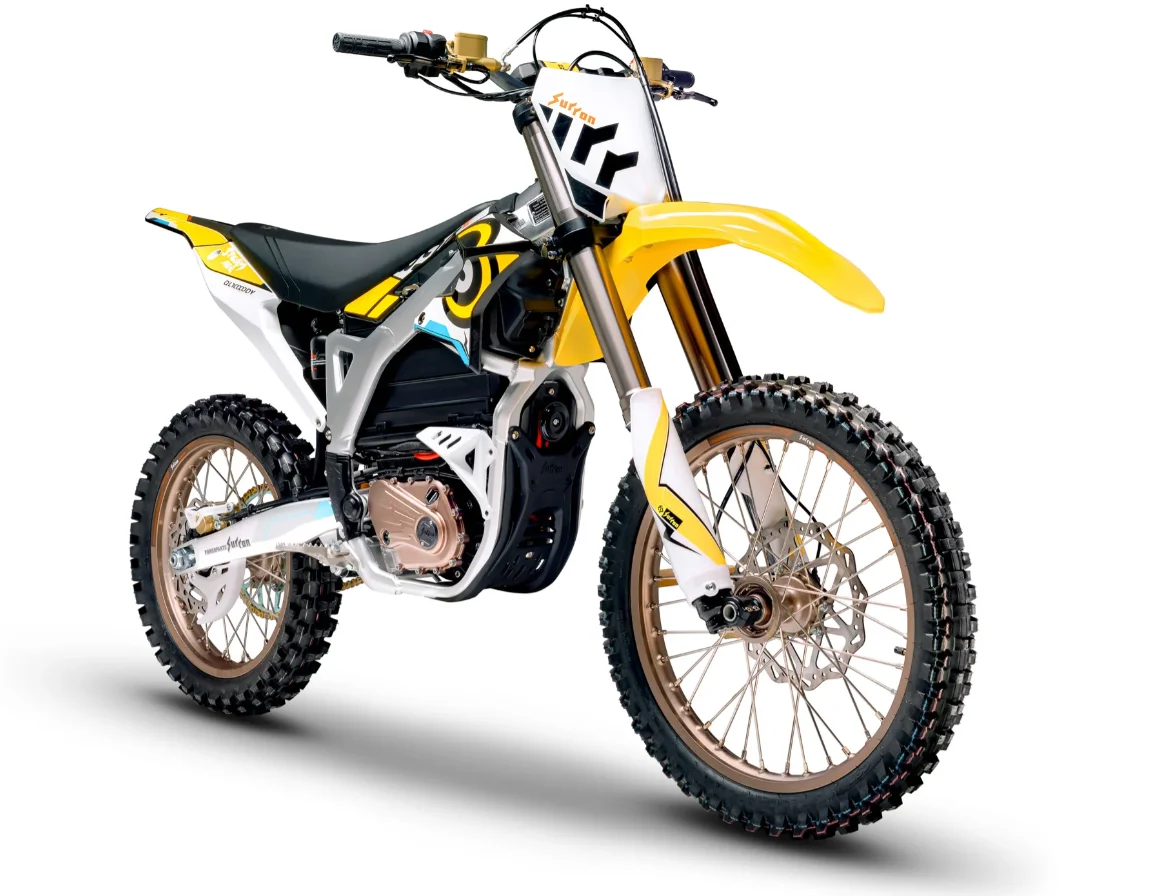Prędkość: Wydajność motocykli elektrycznych
Przyspieszenie i moment obrotowy
Motocykle elektryczne zapewniają natychmiastowe przyspieszenie. W przeciwieństwie do rowerów napędzanych gazem, używają silników elektrycznych, które zapewniają maksymalny moment obrotowy od momentu, gdy zawrócisz gazem. Oznacza to, że bez opóźnień doświadczasz szybkiego i płynnego przyspieszenia. Brak tradycyjnej skrzyni biegów zwiększa tę szybkość reagowania, dzięki czemu jazda jest bardziej płynna. Niezależnie od tego, czy poruszasz się po ulicach miasta, czy wyruszasz na otwarte drogi, natychmiastowa moc daje ci ekscytujące wrażenie. Elektryczne motocykle na nowo definiują poczucie prędkości i kontroli.
Najwyższa prędkość i postęp technologiczny
Współczesne motocykle elektryczne osiągają imponującą prędkość. Postęp w technologii silników i aerodynamice doprowadził do ich osiągnięć, które równają się tradycyjnym motocyklom. Niektóre modele osiągają teraz prędkość ponad 120 mph, co dowodzi ich zdolności do jazdy o wysokiej wydajności. Inżynierowie wciąż wprowadzają innowacje, koncentrując się na lekkich materiałach i wydajnych konstrukcjach silników. Wzrost ten nie tylko zwiększa prędkość, ale także efektywność energetyczną. Możesz cieszyć się dreszczem emocji z dużej prędkości, korzystając z najnowocześniejszych technologii.
Doświadczenie jazdy i obsługa
Motocykle elektryczne oferują wyjątkowe doświadczenie jazdy. Niskie centrum ciężkości, dzięki umieszczeniu baterii, zwiększa stabilność i poruszanie się. Dzięki temu skręty są gładsze i przewidywalniejsze, dzięki czemu masz większą pewność siebie. Brak wibracji silnika sprawia, że jazda jest cichodsza i wygodniejsza. Dodatkowo brak sprzęgła i biegów ułatwia obsługę, dzięki czemu motocykle elektryczne są dostępne dla wszystkich kierowców. Niezależnie od tego, czy jesteś początkującym czy doświadczonym jeźdźcem, doceniasz łatwość i precyzję, jaką przynoszą na każdą podróż.
Wydajność: zużycie energii i innowacje w zakresie baterii
Postęp w technologii akumulatorów
W ostatnich latach technologia akumulatorów poczyniła niezwykły postęp. Współczesne motocykle elektryczne korzystają obecnie z baterii litowo-jonowych, które zapewniają większą gęstość energii i dłuższą żywotność. Akumulatory te przechowują więcej energii w kompaktowym rozmiarze, co pozwala na przejazd na większe odległości za pomocą jednego ładowania. Producenci badają również baterie typu solid-state, które obiecują jeszcze lepsze osiągi i szybszy czas ładowania. Dzięki tym osiągnięciom można się spodziewać, że motocykle elektryczne staną się bardziej niezawodne i wydajne w codziennym użytkowaniu. Koncentracja na poprawie trwałości baterii zapewnia dłuższą trwałość inwestycji przy jednoczesnym zmniejszeniu ilości odpadów.
Infrastruktura ładowania i użyteczność
Ładowanie motocykla elektrycznego stało się bardziej wygodne niż kiedykolwiek. Liczba publicznych stacji ładowania szybko rośnie, dzięki czemu łatwiej jest ładować ładunki podczas dojazdów lub długich podróży. Wiele stacji obsługuje obecnie szybkie ładowanie, dzięki czemu bateria może być naładowana w mniej niż godzinę. Strona główna Opcje ładowania zapewniają również elastyczność, pozwalając na ładowanie przez całą noc i rozpoczęcie każdego dnia z pełną baterią. Niektórzy producenci oferują nawet przenośne ładowarki, dzięki czemu możesz je ładować wszędzie, gdzie tylko się udać. Dzięki temu posiadanie motocykla elektrycznego jest praktyczne i bezstresowe.
Wydajność energetyczna w porównaniu z motocyklami napędzanymi gazem
Motocykle elektryczne są znacznie bardziej energooszczędne niż ich odpowiedniki napędzane gazem. Silniki elektryczne przekształcają ponad 90% energii z akumulatora w ruch, podczas gdy silniki spalinowe tracą większość energii w ciepło. Ta wydajność oznacza, że do przejazdu tej samej odległości zużywa się mniej energii, oszczędzając pieniądze i zmniejszając ślad środowiskowy. Ponadto motocykle elektryczne wymagają mniejszej konserwacji, ponieważ mają mniej ruchomych części. Wybierając motocykl elektryczny, nie tylko korzystasz z płynniejszej jazdy, ale także przyczynia się do bardziej zrównoważonej przyszłości.
Wpływ na środowisko: zrównoważony rozwój i emisje
Zerowe emisje i korzyści dla miast
Motocykle elektryczne nie emitują żadnych gazów. Dzięki temu są doskonałym wyborem do zmniejszania zanieczyszczenia powietrza w miastach. Jeźdząc na nim, pomagasz poprawić jakość powietrza w miastach, co przynosi korzyści zdrowia publicznego. Czystsze powietrze zmniejsza problemy z oddychaniem i stwarza zdrowsze środowisko dla wszystkich. Motocykle elektryczne przyczyniają się również do spokojniejszych ulic. Prawie cicho działając, zmniejszają one hałas, dzięki czemu miasta są spokojniejsze. To cichsze doświadczenie zwiększa jakość jazdy i poprawi jakość życia w miastach.
Względy środowiskowe związane z cyklem życia
Wpływ motocykli elektrycznych na środowisko wykracza poza ich użytkowanie. Produkcja i produkcja baterii wymagają energii i zasobów. Jednak postęp technologiczny zmniejsza te skutki. Wiele producentów koncentruje się obecnie na wykorzystaniu zrównoważonych materiałów i recyklingu baterii. Wybierając motocykl elektryczny, wspierasz te wysiłki. Ważne jest również, ile energii elektrycznej jest używane do ładowania. Odnawialne źródła energii, takie jak energia słoneczna lub wiatrowa, jeszcze bardziej zmniejszają ślad środowiskowy. Możesz zrobić znaczącą różnicę, ładując swój motocykl czystą energią.
Rola w promowaniu zrównoważonego transportu
Motocykle elektryczne odgrywają kluczową rolę w tworzeniu zrównoważonej przyszłości. Oferują one alternatywę dla pojazdów napędzanych gazem, pomagając zmniejszyć zależność od paliw kopalnych. Ich efektywność energetyczna i niskie wymagania konserwacyjne czynią je praktycznym wyborem dla ekologicznie świadomych kierowców. Wprowadzając motocykle elektryczne, zachęcasz innych do rozważenia zrównoważonych opcji transportu. Ta zmiana może doprowadzić do szeroko zakrojonych zmian w sposobie podróżowania. Wspieranie motocykli elektrycznych oznacza przyczynienie się do stworzenia bardziej ekologicznego i zrównoważonego świata.
Motocykle elektryczne stanowią przełomową zmianę w transporcie. Zapewniają niezrównaną prędkość, efektywność energetyczną i korzyści dla środowiska. Dzięki ciągłym postępom w technologii akumulatorów i konstrukcji silników można spodziewać się jeszcze większej wydajności i niezawodności. Motocykle te zmniejszają emisję i uzależnienie od paliw kopalnych, co czyni je kluczowym rozwiązaniem dla zrównoważonej przyszłości. Wybierając motocykle elektryczne, przyczyniacie się do czystszego powietrza, spokojniejszych miast i bardziej zielonego świata. Ich rola w kształtowaniu przyszłości mobilności podkreśla ich znaczenie jako siły przekształcającej w nowoczesnym transporcie.

